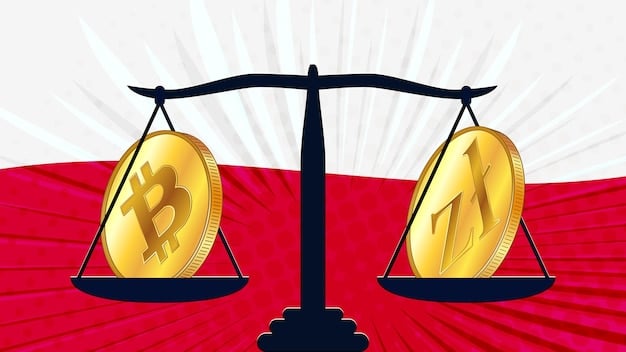News Tokens in US Journalism: Integrity Under Scrutiny

The Impact of News Tokens on Journalistic Integrity: A US Case Study explores how integrating cryptocurrency-based news tokens affects traditional journalistic standards within the United States, considering both innovations and potential ethical compromises.
The rise of blockchain technology and cryptocurrencies has led to innovative approaches in various sectors, including journalism. One such innovation is the introduction of the impact of news tokens on journalistic integrity: a US case study, raising critical questions about the future of news reporting and its adherence to ethical standards.
The Rise of News Tokens in US Media
News tokens, a form of cryptocurrency, are emerging as a potential solution to the financial challenges faced by many news organizations. These tokens aim to create new revenue streams and foster closer relationships with readers. However, their integration into the US media landscape brings forth complex questions regarding journalistic integrity.
What are News Tokens?
News tokens are digital assets that represent a stake in a news organization or specific journalistic projects. They can be used to reward readers for engagement, fund investigative journalism, or provide exclusive content to token holders.
The Appeal of News Tokens
The appeal of news tokens lies in their potential to diversify revenue streams, reduce reliance on traditional advertising, and foster a more engaged and loyal readership. This model also allows for greater transparency in funding and potentially reduces the influence of large corporations or political entities.

Overall, the rise of news tokens presents both opportunities and challenges for the US media industry. While they offer new avenues for financial sustainability and audience engagement, they also demand careful consideration of ethical implications and potential risks to journalistic integrity.
Potential Benefits for Journalistic Independence
News tokens hold the promise of enhancing journalistic independence by diversifying funding sources and reducing reliance on traditional revenue models. This can lead to a more resilient and unbiased media landscape. Let’s explore the potential benefits.
Decentralized Funding Models
News tokens offer a decentralized funding model that can reduce the influence of advertisers or corporate owners on editorial decisions. By directly engaging with readers and creating a community around news, organizations can maintain editorial independence.
Incentivizing Quality Journalism
By rewarding readers for their engagement with tokens, news organizations can incentivize the consumption of high-quality, fact-checked content. This can counteract the spread of misinformation and promote informed public discourse.
- Diversified Revenue Streams: Reduces dependency on traditional advertising.
- Direct Reader Funding: Allows direct financial support from the audience.
- Community Engagement: Fosters a loyal readership invested in quality journalism.
- Transparency: Provides clearer insight into funding sources.
In conclusion, the potential benefits of news tokens for journalistic independence include diversified funding, incentivized quality content, and enhanced community engagement, all of which can contribute to a more resilient and unbiased media landscape in the US.
Ethical Challenges Posed by News Tokens
Despite the potential benefits, news tokens pose significant ethical challenges that need careful consideration. The intersection of cryptocurrency and journalism raises questions about transparency, bias, and the overall integrity of news reporting.
Potential for Bias and Conflicts of Interest
If news organizations hold or benefit financially from their own tokens, it could create conflicts of interest. Favorable reporting on the token or the associated cryptocurrency could compromise objectivity and erode trust.
Transparency and Disclosure Requirements
Clear disclosure requirements are essential to ensure that readers are aware of any financial interests the news organization has in the tokens. Without transparency, readers may not be able to critically assess the information presented.

In summary, the ethical challenges posed by news tokens must be addressed proactively through clear guidelines, transparency, and a commitment to journalistic ethics, to ensure that the pursuit of innovative funding models does not compromise the integrity of news reporting.
US Case Studies: Early Adopters and Their Experiences
Several news organizations in the US have begun experimenting with news tokens, providing valuable insights into the practical implications of this technology. These early adopters offer lessons on both the opportunities and challenges involved.
Civil Media and the Civil Token
Civil Media was an early attempt to create a decentralized news ecosystem using the Civil token. While the project faced challenges and ultimately shut down, it provided valuable lessons about the complexities of building a blockchain-based news platform.
Other Emerging Platforms
Other platforms, such as Steemit and Publish0x, have integrated cryptocurrency rewards for content creators and readers. These platforms offer alternative models for funding and incentivizing journalism, albeit with varying degrees of success.
- Civil Media: Pioneering attempt at decentralized news, faced adoption challenges.
- Steemit: Rewards content creators with cryptocurrency, promoting user-generated content.
- Publish0x: Allows readers to tip authors with cryptocurrency, incentivizing quality content.
- Lessons Learned: Highlights the need for careful planning, community engagement, and sustainable economic models.
The case studies of early adopters in the US demonstrate that while news tokens hold promise, they also require careful planning, robust governance, and a clear understanding of the economic and ethical implications. Success depends on building a strong community, maintaining transparency, and prioritizing journalistic integrity.
Regulatory and Legal Considerations in the US
The regulatory and legal landscape surrounding news tokens in the US is still evolving. Compliance with securities laws, tax regulations, and consumer protection measures is crucial for news organizations venturing into this space.
Securities Laws and Token Offerings
Depending on their structure, news tokens may be classified as securities under US law. This would require compliance with SEC regulations, including registration requirements and disclosure obligations.
Tax Implications for Organizations and Users
Both news organizations and token holders need to be aware of the tax implications associated with news tokens. This includes potential income tax, capital gains tax, and sales tax liabilities.
In conclusion, navigating the regulatory and legal landscape surrounding news tokens requires careful planning, expert advice, and a proactive approach to compliance. News organizations must prioritize transparency and adhere to all applicable laws to build trust and ensure the long-term sustainability of their token-based models.
Strategies for Maintaining Journalistic Integrity
Maintaining journalistic integrity in the age of news tokens requires a multi-faceted approach that includes transparency, ethical guidelines, and independent oversight. Here are some strategies.
Transparency and Disclosure Protocols
News organizations should implement clear and prominent disclosure protocols to inform readers about their financial interests in news tokens. This includes disclosing token holdings, partnerships with cryptocurrency companies, and any potential conflicts of interest.
Establishing Ethical Guidelines and Standards
Developing ethical guidelines and standards that specifically address the use of news tokens is crucial. These guidelines should cover issues such as objectivity, impartiality, and avoiding conflicts of interest. An independent body should oversee the application of those guidelines.
- Clear Disclosure: Inform readers about financial interests in news tokens.
- Ethical Guidelines: Develop standards for objectivity and impartiality.
- Independent Oversight: Ensure compliance with ethical standards.
- Education: Train journalists on the ethical implications of news tokens.
Transparency, ethical guidelines, independent oversight, and continuous education are key to navigating the complex landscape of news tokens while upholding the principles of journalistic integrity.
| Key Point | Brief Description |
|---|---|
| 💰 Diversify Revenue | News tokens offer alternative funding sources. |
| ✍️ Ethical Challenges | Potential bias and conflicts of interest must be addressed. |
| ⚖️ Regulatory Compliance | Adherence to securities and tax laws is crucial. |
| 🛡️ Maintain Integrity | Transparency and independent oversight are essential. |
Frequently Asked Questions
▼
News tokens are cryptocurrencies designed to support journalism. They can be used to reward readers, fund projects, or provide exclusive content. Essentially, they create an economic ecosystem around news content.
▼
News tokens offer diversified revenue streams, reducing reliance on ads. They can foster closer reader relationships and incentivize quality content, promoting a more sustainable and independent press.
▼
Potential biases, conflicts of interest, and lack of transparency pose ethical challenges. News organizations must ensure objectivity and disclose financial interests to maintain reader trust and journalistic integrity.
▼
Securities laws, tax regulations, and consumer protection measures apply. Depending on their structure, news tokens may be subject to SEC regulations, requiring registration and compliance to avoid legal issues.
▼
Clear disclosure protocols, ethical guidelines, and independent oversight are essential. By prioritizing transparency and committing to high ethical standards, news organizations can navigate the challenges effectively.
Conclusion
The integration of news tokens into the US journalistic landscape presents both unprecedented opportunities and significant challenges. While they offer the potential to revolutionize funding models and enhance journalistic independence, they also raise critical ethical and regulatory questions that must be addressed to preserve the integrity of news reporting. With careful planning, transparency, and a commitment to ethical standards, news tokens can contribute to a more sustainable and vibrant media ecosystem in the United States.





